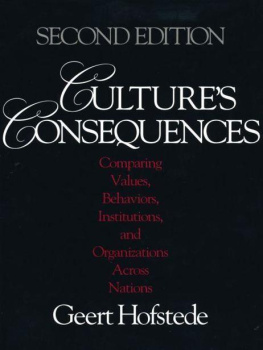Cultures and Organizations
SOFTWARE OF THE MIND
Intercultural Cooperation and Its Importance for Survival
Geert Hofstede
Gert Jan Hofstede
Michael Minkov


Copyright 2010 by Geert Hofstede BV. All rights reserved. Printed in the United States of America. Except as permitted under the United States Copyright Act of 1976, no part of this publication may be reproduced or distributed in any form or by any means, or stored in a database or retrieval system, without the prior written permission of the publisher.
ISBN: 978-0-07-177015-6
MHID: 0-07-177015-1
The material in this eBook also appears in the print version of this title: ISBN: 978-0-07-166418-9, MHID: 0-07-166418-1.
All trademarks are trademarks of their respective owners. Rather than put a trademark symbol after every occurrence of a trademarked name, we use names in an editorial fashion only, and to the benefit of the trademark owner, with no intention of infringement of the trademark. Where such designations appear in this book, they have been printed with initial caps.
McGraw-Hill eBooks are available at special quantity discounts to use as premiums and sales promotions, or for use in corporate training programs. To contact a representative please e-mail us at bulksales@mcgraw-hill.com.
TERMS OF USE
This is a copyrighted work and The McGraw-Hill Companies, Inc. (McGraw-Hill) and its licensors reserve all rights in and to the work. Use of this work is subject to these terms. Except as permitted under the Copyright Act of 1976 and the right to store and retrieve one copy of the work, you may not decompile, disassemble, reverse engineer, reproduce, modify, create derivative works based upon, transmit, distribute, disseminate, sell, publish or sublicense the work or any part of it without McGraw-Hills prior consent. You may use the work for your own noncommercial and personal use; any other use of the work is strictly prohibited. Your right to use the work may be terminated if you fail to comply with these terms.
THE WORK IS PROVIDED AS IS. McGRAW-HILL AND ITS LICENSORS MAKE NO GUARANTEES OR WARRANTIES AS TO THE ACCURACY, ADEQUACY OR COMPLETENESS OF OR RESULTS TO BE OBTAINED FROM USING THE WORK, INCLUDING ANY INFORMATION THAT CAN BE ACCESSED THROUGH THE WORK VIA HYPERLINK OR OTHERWISE, AND EXPRESSLY DISCLAIM ANY WARRANTY, EXPRESS OR IMPLIED, INCLUDING BUT NOT LIMITED TO IMPLIED WARRANTIES OF MERCHANTABILITY OR FITNESS FOR A PARTICULAR PURPOSE. McGraw-Hill and its licensors do not warrant or guarantee that the functions contained in the work will meet your requirements or that its operation will be uninterrupted or error free. Neither McGraw-Hill nor its licensors shall be liable to you or anyone else for any inaccuracy, error or omission, regardless of cause, in the work or for any damages resulting therefrom. McGraw-Hill has no responsibility for the content of any information accessed through the work. Under no circumstances shall McGraw-Hill and/or its licensors be liable for any indirect, incidental, special, punitive, consequential or similar damages that result from the use of or inability to use the work, even if any of them has been advised of the possibility of such damages. This limitation of liability shall apply to any claim or cause whatsoever whether such claim or cause arises in contract, tort or otherwise.
Contents
PART I
The Concept of Culture
PART II
Dimensions of National Cultures
PART III
Cultures in Organizations
PART IV
Implications
Preface
In the late 1960s Geert accidentally became interested in national cultural differencesand got access to rich data for studying them. His research resulted in the publication in 1980 of a book called Cultures Consequences. It was written for a scholarly readership; it had to be, because it cast doubts on the universal validity of established theories in psychology, organization sociology, and management theory: so it should show the theoretical reasoning, base data, and statistical treatments used to arrive at the conclusions. A 1984 paperback edition of the book left out the base data and the statistics but was otherwise identical to the 1980 hardcover version.
Cultures Consequences appeared at a time when the interest in cultural differences, both between nations and between organizations, was sharply rising, and there was a dearth of empirically supported information on the subject. The book provided such information, but maybe too much of it at once. Many readers evidently got only parts of the message. For example, Geert lost count of the number of people who claimed that Geert had studied the values of IBM (or Hermes) managers. The data used actually were from IBM employees, and that, as the book itself showed, makes quite a difference.
In 1991, after having taught the subject to many different audiences and tested his text on various helpful readers, Geert published a book for an intelligent lay readershipthe first edition of Cultures and Organizations: Software of the Mind. The theme of cultural differences is, of course, not onlyand even not primarilyof interest to social scientists or international business students. It pertains to anyone who meets people from outside his or her own narrow circle, and in the modern world this is virtually everybody. The new book addressed itself to any interested reader. It avoided social scientific jargon where possible and explained it where necessary; a Glossary was added for this purpose. Slightly updated paperback editions appeared in 1994 and 1997.
In the meantime the worlds of politics, of business, and of ideas kept changing fast. In 2001 Geert published a rewritten and updated version of Cultures Consequences that included a discussion of the many replications by other researchers that had appeared since 1980. Anybody whose purpose is research or academic scrutiny is referred to this source.
In 2005 Geert issued a rewritten and updated version of Cultures and Organizations: Software of the Mind. Gert Jan Hofstede joined him as a coauthor. After having majored in biology and taught information systems at Wageningen agricultural university, Gert Jan had started to use his fathers work in his own teaching and research. In 2002 he had already published his own book, Exploring Culture: Exercises, Stories and Synthetic Cultures, which included contributions from Paul B. Pedersen and from Geert. Gert Jan contributed experience with the role of culture in international networks, hands-on experience in teaching the subject through simulation games, and insight into the biological origins of culture.
Ever since his first cross-cultural research studies, Geert has continued exploring alternative sources of data, to validate and supplement his original, accidental IBM employee data set. In the past three decades the volume of available cross-cultural data on self-scored values has increased enormously. Geert used to say that if he had to start his research again, he would use a choice from these new databases. About ten years ago, Geert got into e-mail contact with a researcher in Sofia, Bulgaria, who seemed to be engaged in exactly that: scanning available databases and looking for structure in their combined results. The name of this researcher was Michael Minkov, and we learned to call him Misho. In 2007 Misho published his analyses in a book,











